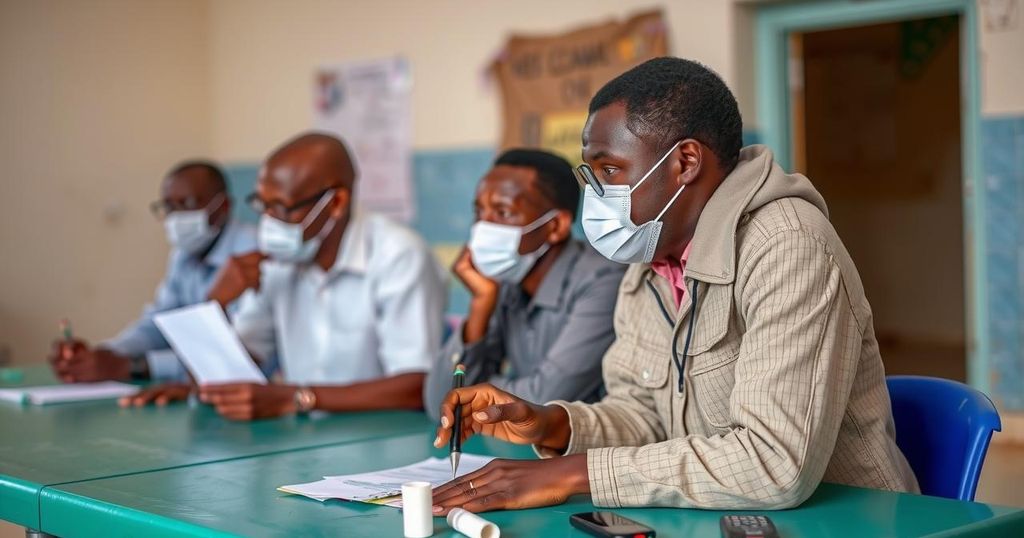Chad’s Electoral Commission Seeks Military Support Amid Violence Ahead of Elections

Chad’s electoral commission has requested military assistance to protect election officials amid increasing violence from opposition supporters ahead of the December 29 elections. Tensions have risen as opposition factions disrupt rallies organized by the ruling MPS party, prompting fears of escalating conflict. Allegations of electoral manipulation and claims of illegitimacy further cloud the political landscape.
In Chad, the electoral commission has formally requested military assistance to safeguard election officials and candidates in anticipation of the upcoming elections scheduled for December 29. Recent reports of intensified violence, particularly from opposition supporters wielding clubs and iron bars, have aimed to obstruct campaign efforts by the ruling Patriotic Salvation Movement (MPS) party in various cities. The National Election Management Agency (ANGE) has revealed that the ongoing electoral campaigning process for parliamentary, local council, and regional elections has experienced significant disruptions due to these aggressive actions.
Chad’s leadership has indicated that these elections will conclude a three-year transitional phase initiated following the death of President Idriss Deby Itno in April 2021. Vice President of ANGE, Assane Bairra, has expressed concern that if military intervention is not promptly executed, the prevailing tensions may escalate into armed conflict. Registration records show that approximately 8.3 million of Chad’s 18 million citizens are eligible to vote, with around 180 political entities nominating nearly 1,300 candidates for the parliamentary contest.
Despite the extensive preparations, a coalition comprising over 75 opposition parties and civil society organizations has denounced the electoral process, labeling it a “masquerade.” They assert that President Mahamat Idriss Deby Itno and the MPS intend to utilize the election to reinforce their power. Reports indicate that opposition supporters have recently engaged in violent acts against MPS campaigners in towns, including N’Djamena and Moundou, while military forces have intervened to dismantle barriers imposed by opposition factions.
Avocksouma Djona, president of the Party of Democrats, has argued for the postponement of the elections, citing concerns about the impartiality of Chad’s election management body; he claims that all officials were appointed by Deby, who retains control over the constitutional court. “Deby controls Chad’s constitutional court and has instructed the court to declare his party victorious in all elections,” he stated.
President Deby has publicly asserted that the forthcoming elections will facilitate a return to civilian governance characterized by fairness and transparency. However, opposition groups have quickly dismissed these claims, maintaining that the regime’s objective is to manipulate the electoral process to sustain its parliamentary hold. Deby’s ascension to the presidency took place in April 2021, succeeding his father, who had governed the nation for three decades before his death in conflict. Though Deby promised an 18-month transitional government, he subsequently extended this period by an additional two years, further complicating the political landscape in Chad.
The context of the upcoming elections in Chad is rooted in a turbulent political environment marked by the death of longtime President Idriss Deby Itno in April 2021, leading to a transitional government under his son, Mahamat Idriss Deby Itno. This transition was initially intended to last 18 months; however, it has been extended, igniting unrest and dissatisfaction among opposition factions. The current electoral process faces claims of illegitimacy and control by the ruling party, further exacerbated by acts of violence and suppression against candidates and supporters from various political affiliations, highlighting the precarious nature of democratic processes in Chad.
In summary, the situation in Chad ahead of the December 29 elections is fraught with tension and potential violence, as the electoral commission seeks military protection amidst reports of opposition-led disruptions. The ruling party’s dominance and the opposition’s allegations of electoral manipulation complicate the potential for a transparent and fair voting process. The outcome of these elections is crucial, not only for the political future of Chad but also for the civil rights of its citizens. Without effective military intervention and electoral integrity, the country may face further instability.
Original Source: www.voanews.com







